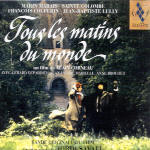In eras long past, etiquette gurus dictated that a 10th-anniversary celebration be marked with a gift of tin or aluminum. I learned recently that there’s a “modern” replacement for those outdated and modest metals: an occasion of such magnitude demands no less than diamonds. Whether that change is due more to rising divorce rates or the advertising powers of De Beers, I don’t know. But the wholly unnecessary release of a special limited edition reissue of the soundtrack to the French film Tous les matins du monde strikes me as a similarly empty move.
Most people who are interested in this material are certain to already own this disc and probably have some dim recall of the visually pretty and marginally memorable film it accompanied, a minor art-house sensation. But to recap: the film (featuring Gérard Depardieu) was an adaptation of Pascal Quignard’s novel of the same name, which imagined the life of one Monsieur de Sainte Colombe, a 17th-century French composer about whom precious little is known, not even his first name. By far, the best part of the movie was this soundtrack, which featured the inimitable Jordi Savall, here playing bass viol and directing the musicians, along with an array of his usual colleagues: sopranos Montserrat Figueras and Maria Christina Kiehr; violinist Fabio Biondi; bass viol players Christophe Coin and Jérôme Hantaï; Rolf Lislevand playing theorbo; and Pierre Hantaï performing on harpsichord.
The soundtrack gathers together works by Sainte Colombe and several better-known contemporaries: Lully, Couperin, and Marais. The disc is as lovely now as it was 10 years ago, though it’s still far too early to say that it’s stood the test of time! However, it stands well on its own terms, unlike some other movie soundtracks. When the first release was issued, I listened to it over and over again, especially to the darkly luxurious works for bass viol: short as they are, Marais’ delicate Les Pleurs, the same composer’s haunting Sonnerie de Ste. Geneviève du Mont-de-Paris (featuring Biondi, Pierre Hantaï, and Lislevand with Savall), and Savall’s improvisation on Sainte Colombe’s somber Prelude in G minor are particular standouts–and they remain so.
If you do own this disc already, there’s no reason to replace your old copy. The disc was remastered for the re-release but the differences between Version I and II are imperceptible. The notes have changed some, though: we’ve lost short bios of Sainte Colombe, Marais, and Savall and “gained” a brief, totally superficial essay on 17th-century France and a strange note from Pascal Quignard. (“Messages of truth flow through bodies, unperceived by the senders and receivers of those messages.”) Not even the “Ten Years Later” bonus disc, a compilation of works by the same composers that also features Savall’s group Le Concert des Nations (and, like the main disc, begins with Lully’s Marche pour la Cérémonie Turque) makes this a necessary buy. But if by some chance you never happened upon the original Tous les matins du monde, then this is a strongly recommended purchase.
































